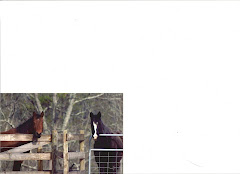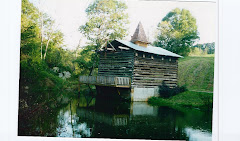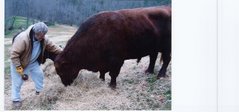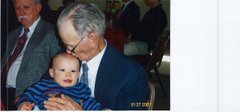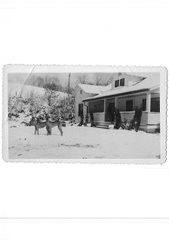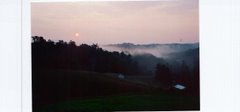My great-aunt Thelma was a force to be reckoned with. Stout of heart and body, her corset pulled tight by long laces, she moved through the days of her life busy with the work of God and man. Her round face, usually smiling, was wreathed with long braids wrapped round her head. When she took her daily nap, we were awed to see her unlace her corset before she lay down and even more dumbfounded to watch her lace it back up again. Hugging Aunt Thelma was like hugging a tree. Above you there was warmth and softness, but where you reached to hug there was only a generous sized unyielding whalebone encased midsection.
She was always on her way somewhere or doing something and talking non-stop with her Virginia Tidewater brogue a treat to my ears. Her pickled peaches were a gourmet treat and a meal at her house was a pleasure. She and Uncle Bill, my granddaddy’s younger brother, lived in my great-grandparents house on the family farm. The front door had a doorbell that you “rang” by turning the handle which we children did ,often to the chagrin of the adults who would eventually tire of our fun and tell us to stop. Trees as old as time shaded the front yard and the side porch. In the library along with Aunt Thelma’s extensive collection of Reader’s Digest Condensed books, stood an antique square piano that I loved to play even though it was in sore need of repair and tuning.
Aunt Thelma and Uncle Bill never had any children so Bruington Baptist Church, our family church in Virginia, became her family and she was an ever present force in that community. Preachers came and went but Aunt Thelma remained. Sunday School teacher of the same children’s class for years, Women’s Missionary Union president, deacon without the name, she provided pastoral care for generations of church members whether they knew they needed it or not. Sitting on Grandma’s porch, we saw her car pass by on the road at the end of the lane at least three times a week on her way to church. When we saw her pass by, we knew we should leave soon or we would be late. During the years when my grandparents did not have a car, she would pull in and pick them up for church.
Her life surveyed and judged by today’s standards might seem limited and poor. They did not travel much past Richmond nor did they have much of what we deem important today. They had enough to be comfortable... enough food, much of it grown in their garden, shelter in the old family home, friends, a place in their community, church and work to do. Uncle Bill’s job as a mailman guaranteed them a salary in times when money was scarce. And yet her life was rich in many ways... rich in connection and community, full of family and friends, faithful to her church and her beliefs. She lies buried now in the old churchyard at Bruington Baptist, the last resting place for many of my mother’s family.
Lent, like Aunt Thelma laced up in her corset, is stiff and unyielding in its insistence upon our taking a long hard look at our hidden selves, the petty, mean and unattractive parts of ourselves that need a spring cleaning. Hugging Lent, like hugging Aunt Thelma, feels stiff and unnatural to souls that are emerging from winter’s darkness in need of warmth and light. But in the embrace of Lent, we find forgiveness as well as judgement, light as well as darkness and love as well as loathing. Paradox Mystery... lose your life to save it, he said. Look at all that you need to let go, lose it, and move on to the new life waiting for you around the corner. If you are faithful to the process, like Aunt Thelma at Bruington Baptist Church, a life rich in all that really matters is yours. Today I will search for and name the places and people to whom I wish to be faithful. I will list the ways I have failed and ask forgiveness for my mistakes and sins. And I will rest in the old, old promise that though my sins be as scarlet, they shall be as white as snow. Please, Lord?
Tuesday, March 9, 2010
Monday, March 8, 2010
Experience the Progression of the Experience
The following passage is the conclusion from Wendell Berry’s book “Life Is A Miracle”. I have been reading and re-reading this book for Lent and it has been a rich read. His education and writing skills have caused me to commit the sin of envy, fodder for my Lenten reflections. His words applied to my religious experience remind me how difficult it is to pass on what it is I know, what I have felt, what I have lived in my life with God. It is both judgement and hope for our future as children of God.
In speaking of the reductionism of modern science, we should not forget that the primary reductionism is in the assumption that human experience or human meaning can be adequately represented in any human language. This assumption is false.
To show what I mean, I will give the example that is most immediate to my mind:
My grandson, who is four years old, is now following his father and me over some of the same countryside that I followed my grandfather and father over. When his time comes, my grandson will choose as he must, but so far, all of us have been farmers. I know from my grandfather that when he was a child he too followed his father in this way, hearing and seeing, not knowing yet that the most essential part of his education had begun.
And so in this familiar spectacle of a small boy tagging along behind his father across the fields, we are a part of a long procession, five generations of which I have seen, issuing out of generations lost to memory, going back for all I know, across previous landscapes and the whole history of farming.
Modern humans tend to believe that whatever is known can be recorded in books or on tapes or computer discs and then learned again by those artificial means.
But it is increasingly plain to me that the meaning, the cultural significance, even the practical value, of this sort of family procession across a landscape can be known but not told. These things, though they have a public value, do not have a public meaning; they are too specific to a particular small place and its history. This is exactly the tragedy in the modern displacement of people and cultures.
My father, his father and his grandfathers before that were farmers in Georgia. My mother’s father and her grandfathers were farmers in Virginia. They each carry in their memories farming skills peculiar to their own geographical location at birth. Mother’s memories as she tagged along side her daddy, riding the plow horse as the fields were plowed, neighbors gathering to harvest the ice pond in the winter, the truck that came each week to the farm with fresh fish from the Chesapeake Bay, growing wheat to grind for your flour supply so bread could be baked... Her memories are so different from my daddy’s.
Daddy tended cows that were set free to roam the woods and fields each morning. It was his responsibility to gather them up in the evening. Growing tobacco, cotton and corn was hard work and all the children were field hands. Cornbread and biscuits, cane syrup, meat butchered in the backyard and smoked in the smokehouse, mules that provided the power needed to plow and harvest the crops... farming of a different sort from my mother’s experience.
I have heard these stories all my life and they are a treasure. And yet, hearing the stories does not teach me how to butcher a yearling, how to grow a healthy pasture, how to harvest ice, or how to plow with a horse or mule. Even growing up on my parent’s farm, I never lived what they lived, never felt the cycle of the seasons in quite the same way, felt the back breaking work necessary for survival, or had the same pleasures of swimming in the creek, watching the deer eat the windblows in the apple orchard in the early morning, eating the canned pork tenderloin that lives in my mother’s memory as one of the best tasting foods of her childhood.
And so it is with my faith experience. I can tell the stories of my mother growing up in the oldest Baptist church in Virginia, my growing up Baptist in a small country church in Georgia, being a part of a succession of Baptist churches all my adult life until my denomination self-destructed, leaving my faith home place and traveling to the strange land of a new denomination. These stories have a public meaning as Berry says but the private meaning, the particular meaning is impossible for me to capture in words alone.
Lent is a part of a faith experience that is public and particular at the same time. Its history is rooted in our beginnings with the meaning of many of its traditions lost in the telling of the stories. Knowledge captured in words written and spoken sheds a light on our path as we make this inward journey. Telling what we know, what we feel, what we have experienced is the only way we can hold on to the procession of the faithful through the centuries before us, all the grandfathers and grandmothers who walked before us on the Christian path to God.
Like the farmer in the parable of the barren fig tree, I have another year to dig and fertilize my soul during this particular season. So I practice Lent, walking in the fields of Christian experience, continuing my education, hearing and seeing and beginning to know some of what I need to know to be a competent Christian. And I write of this knowing words are a poor vehicle for the expression of my experience but it is the best I can do. And in the writing I become a part of “the living procession through time in a place that is the record by which such knowledge survives and is conveyed. When the procession ends, so does the knowledge.” May it never end.
In speaking of the reductionism of modern science, we should not forget that the primary reductionism is in the assumption that human experience or human meaning can be adequately represented in any human language. This assumption is false.
To show what I mean, I will give the example that is most immediate to my mind:
My grandson, who is four years old, is now following his father and me over some of the same countryside that I followed my grandfather and father over. When his time comes, my grandson will choose as he must, but so far, all of us have been farmers. I know from my grandfather that when he was a child he too followed his father in this way, hearing and seeing, not knowing yet that the most essential part of his education had begun.
And so in this familiar spectacle of a small boy tagging along behind his father across the fields, we are a part of a long procession, five generations of which I have seen, issuing out of generations lost to memory, going back for all I know, across previous landscapes and the whole history of farming.
Modern humans tend to believe that whatever is known can be recorded in books or on tapes or computer discs and then learned again by those artificial means.
But it is increasingly plain to me that the meaning, the cultural significance, even the practical value, of this sort of family procession across a landscape can be known but not told. These things, though they have a public value, do not have a public meaning; they are too specific to a particular small place and its history. This is exactly the tragedy in the modern displacement of people and cultures.
My father, his father and his grandfathers before that were farmers in Georgia. My mother’s father and her grandfathers were farmers in Virginia. They each carry in their memories farming skills peculiar to their own geographical location at birth. Mother’s memories as she tagged along side her daddy, riding the plow horse as the fields were plowed, neighbors gathering to harvest the ice pond in the winter, the truck that came each week to the farm with fresh fish from the Chesapeake Bay, growing wheat to grind for your flour supply so bread could be baked... Her memories are so different from my daddy’s.
Daddy tended cows that were set free to roam the woods and fields each morning. It was his responsibility to gather them up in the evening. Growing tobacco, cotton and corn was hard work and all the children were field hands. Cornbread and biscuits, cane syrup, meat butchered in the backyard and smoked in the smokehouse, mules that provided the power needed to plow and harvest the crops... farming of a different sort from my mother’s experience.
I have heard these stories all my life and they are a treasure. And yet, hearing the stories does not teach me how to butcher a yearling, how to grow a healthy pasture, how to harvest ice, or how to plow with a horse or mule. Even growing up on my parent’s farm, I never lived what they lived, never felt the cycle of the seasons in quite the same way, felt the back breaking work necessary for survival, or had the same pleasures of swimming in the creek, watching the deer eat the windblows in the apple orchard in the early morning, eating the canned pork tenderloin that lives in my mother’s memory as one of the best tasting foods of her childhood.
And so it is with my faith experience. I can tell the stories of my mother growing up in the oldest Baptist church in Virginia, my growing up Baptist in a small country church in Georgia, being a part of a succession of Baptist churches all my adult life until my denomination self-destructed, leaving my faith home place and traveling to the strange land of a new denomination. These stories have a public meaning as Berry says but the private meaning, the particular meaning is impossible for me to capture in words alone.
Lent is a part of a faith experience that is public and particular at the same time. Its history is rooted in our beginnings with the meaning of many of its traditions lost in the telling of the stories. Knowledge captured in words written and spoken sheds a light on our path as we make this inward journey. Telling what we know, what we feel, what we have experienced is the only way we can hold on to the procession of the faithful through the centuries before us, all the grandfathers and grandmothers who walked before us on the Christian path to God.
Like the farmer in the parable of the barren fig tree, I have another year to dig and fertilize my soul during this particular season. So I practice Lent, walking in the fields of Christian experience, continuing my education, hearing and seeing and beginning to know some of what I need to know to be a competent Christian. And I write of this knowing words are a poor vehicle for the expression of my experience but it is the best I can do. And in the writing I become a part of “the living procession through time in a place that is the record by which such knowledge survives and is conveyed. When the procession ends, so does the knowledge.” May it never end.
Subscribe to:
Comments (Atom)

